Classic Cartridges II
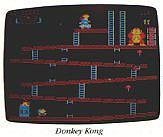
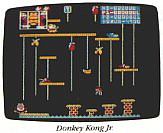

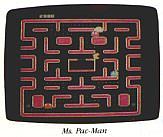
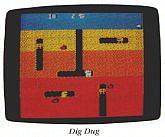
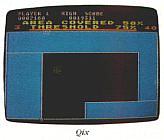
Ms. Pac Man, Donkey Kong Jr., Dig Dug and more.
By Matthew RatcliffHere are some more of the classic Atari game cartridges that are still available for your new Atari XE Game System – or for any other Atari 8-bit computer. Just like the other 10 popular cartridge classics we reviewed in the July 1988 Antic, these games are rated on a four-star system.
Classic Atari game cartridges have become easier to find at retail outlets since the release of the XEGS computer last Christmas. You can also order cartridges directly from the Atari Corp. Atari's warehouse stock has been repackaged in uniformly designed boxes and is now priced from $19.95 to $22.95 each. Meanwhile, many dealers are still selling out their old packages at prices below the current list.
DONKEY KONG *** 1/2
A very large simian creature has run amok and stolen the hero's sweetheart in this superb port from the original coin-op Donkey Kong. Kong doesn't look anything like a Donkey – this game originated in Japan, loosely translating as "Crazy Kong" in English.You'll make Mario the construction worker climb the girders to retrieve his true love. On the first level you must jump barrels and fireballs and climb ladders toward the fierce Kong and Mario's bewildered darling. Along the way Mario can jump up and grab some hammers to bash a few barrels, although the longer it takes to get to the top, the smaller bonus score you'll earn and the faster Kong tosses barrels at you. Once you've reached the top, it's true love again – until Kong becomes furious and snatches the lady off to the next level.
Higher yet on the girders, Kong and Mario's girlfriend await. Kong sends down fireballs as you help Mario climb up and across the grid of beams. For bonus points along the way, Mario can pick up personal effects dropped by his kidnapped cutie. When Mario jumps over the pins in the girder, he deftly pulls them out. Once all six pins are removed, the structure falls, taking Kong with it and giving him a serious bonk on the head.
But Kong has one tough noodle, and he moves on to another level, similar to the first screen, but he's much more aggressive with the barrel tossing. If Mario survives this level, he and Kong duke it out on yet another portion of the superstructure where moving elevators, bouncing girders and other hazards continue to challenge Mario.
Donkey Kong is a notably chivalrous game scenario among all too many shoot-em-ups. Eventually Kong defeats Mario, but there's always the [START] key to try again for more points.
DONKEY KONG JR. ***
Donkey Kong was a smash hit in the arcades, so Nintendo, the original maker of the Donkey Kong and Mario Brothers video game series, followed up with Donkey Kong Jr. In this scenario, Donkey Kong Senior is under lock and key, guarded by the victorious Mario.In this game you assume the role of poor Kong Junior, desparately trying to save Papa Kong from the vengeful Mario. There are four challenging levels – the vine, chain, jump board and hideout scenes.
On a scale of 1 to 10, I would rate the difficulty level of Donkey Kong at 5, whereas Donkey Kong Jr. is easily an 8 or 9. Only a few times have I gotten past the first screen, in which Junior must jump up onto vines and climb them, knocking down fruits, which can clobber the snapjaws – vine-climbing piranhas. He must jump across platforms and climb until he finally reaches Mario's platform at the top. Here Junior must jump quickly, grab the key and release Papa – briefly. Mario always manages to recapture Donkey Kong Senlor, taking you to the next level of game play.
At the chains level Junior must insert six keys into six locks, pushing them up the chains while avoiding birds and more snapjaws. All six keys are needed to unlock Papa Kong, but Mario doesn't waste any time in recapturing him.
At the jump board and hideout levels things get even hairier, with more and stronger foes for poor Junlor to conquer along the way.
I recommend this game for master arcade gamers with lightning reflexes. Both Donkey Kong games are superb conversions of the original coin-arcade hits.
PAC-MAN *** 1/2
Not every video game has a breakfast cereal, a kids' noodle snack and a Saturday morning cartoon named after it, but Pac-Man does. Mr. Pac is into eating dots, and the ghosts are out to eat him. Along the way Pac-Man can eat the flashing power pills for bonus points, briefly turning the tables on the nasty ghosts.This is a perfect conversion of the Arcade classic, much better than the "flicker-matic" version done for the Atari 2600. It can get boring once you've mastered the lower levels, but you can always speed it up at the options screen before starting.
The maze screen remains the same at every level. The arcade original was quite susceptible to "pattern playing." Once you had the basic actions of the ghosts down pat, you could play a certain "pattern" at each level and really rack up the points. However, in the home computer version, these patterns don't seem to show up, and the game is more challenging.
MS. PAC-MAN *** 1/2
The art of video gaming traditionally had been a young man's fancy, but Pac-Man attracted a lot of ladies. Bally (originators of the Pac-Man family) noticed this too, and built a new, more sophisticated, feminine version of a great game.In Ms. Pac-Man that cute little muncher, complete with lipstick and a bow, gobbles dots and power pills, just like her male counterpart, as ghosts chase her about. Unlike Pac-Man, where fruit bonuses are in fixed locations, Ms. Pac-Man must chase them around on the screen. Also, the screens in this rendition differ between levels, making it harder to master all the escape routes from the ghosts.
Ms. Pac-Man is more sophisticated than Pac-Man, maybe a bit more playable and not quite as monotonous. One of these games is a must for any complete gamer's cartridge library, but I don't think they're dissimilar enough to purchase both. Maybe Atari could release them both in one super cartridge.
DIG DUG ***
Digging for gold isn't a simple job anymore. The hills are infested with all sorts of nasty little creatures, and you're just the high-tech exterminator to do the job.The introductory music and sound effects of this game are captivating. Your job is to dig through the ground and zap all the little bugs and fire-breathing creatures before they zap you. The Dig Dug game screen is like looking into Pee Wee Herman's ant farm. If you dig into a cavity occupied by a bug, the critter attacks. You must fire first, zapping it with your lightening-bolt stun-gun. Three zaps are always needed to kill one of these baddies. Wait too long between zaps and the bugs will recover and grab you. Dig under what looks like a buried eggplant, with the bad guys in hot pursuit, and they'll get it in the chops.
You can't wait around too long, or the bugs, in ghost fashion, will fly through walls after you. The last bug at each level always hightails it for the exits – zap him for bonus points.
Each level has more bugs to bonk. They're more vicious and they move faster. Eventually the mines and bugs are the death of you.
All too many games are simply an exercise in wrist wrenching in pursuit of a higher score. Dig Dug is a bit too cutesy, but it's a faithful conversion of the popular original coin-op game.
QIX **
In Qix, you must protect your land from the invading grid bugs. On a large, mostly blank display you begin drawing boxes. If you're brave, holding the fire button during the draw slows you down for more points. Each time your drawing line reaches a previously drawn edge, the land is filled and reclaimed as yours. land reclaimed slowly, in red, is more valuable than that gained quickly.This game is an accurate conversion of the coin op, but seems just too slow. If you liked the arcade original, then this classic deserves a place in your cartridge library. If Atari ever re-releases Qix, they should consider speeding it up.
$19.95 to $22.95 each.
Atari Corp.
1196 Borregas Avenue
Sunnyvale, CA 94086.
(415) 745-2000.